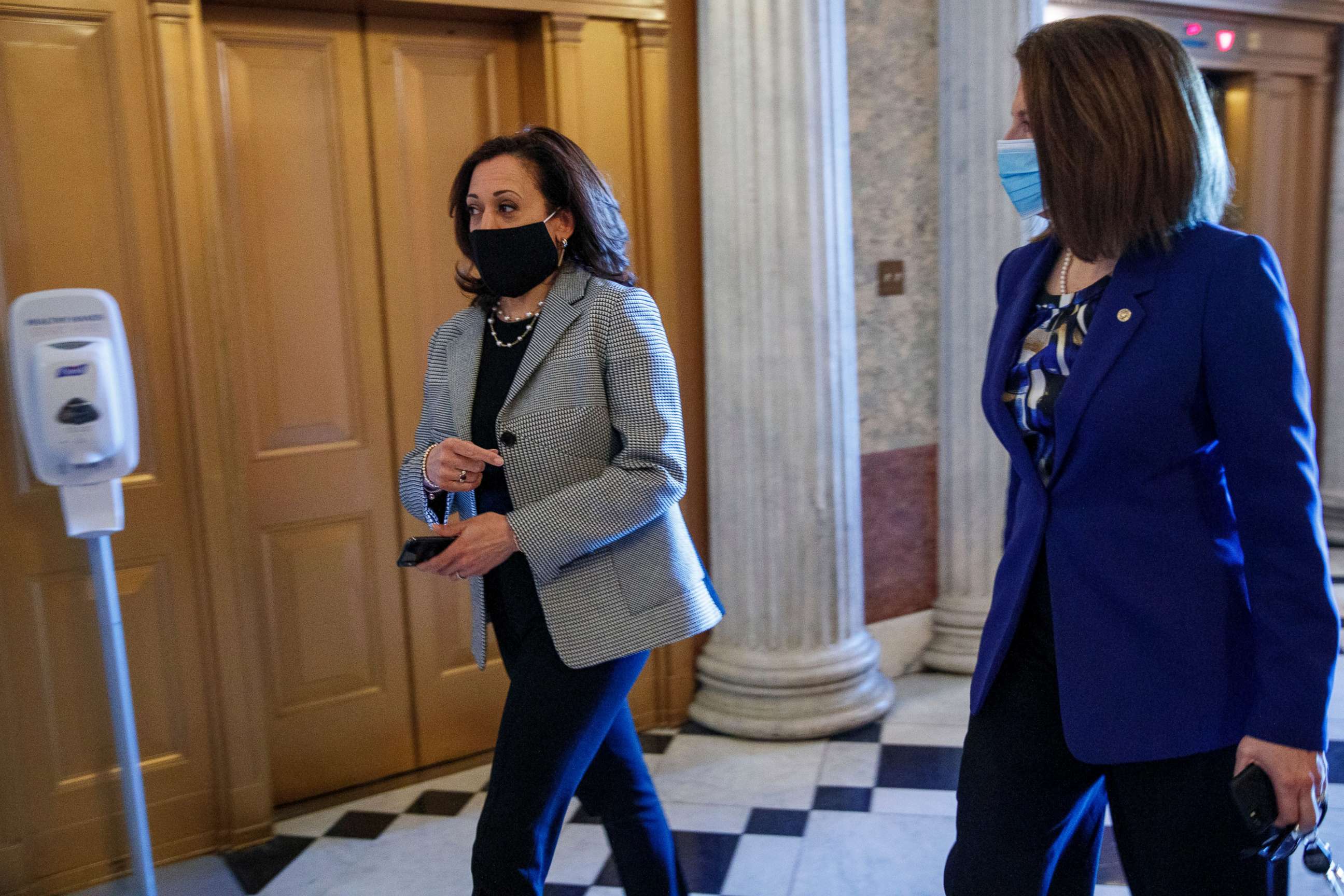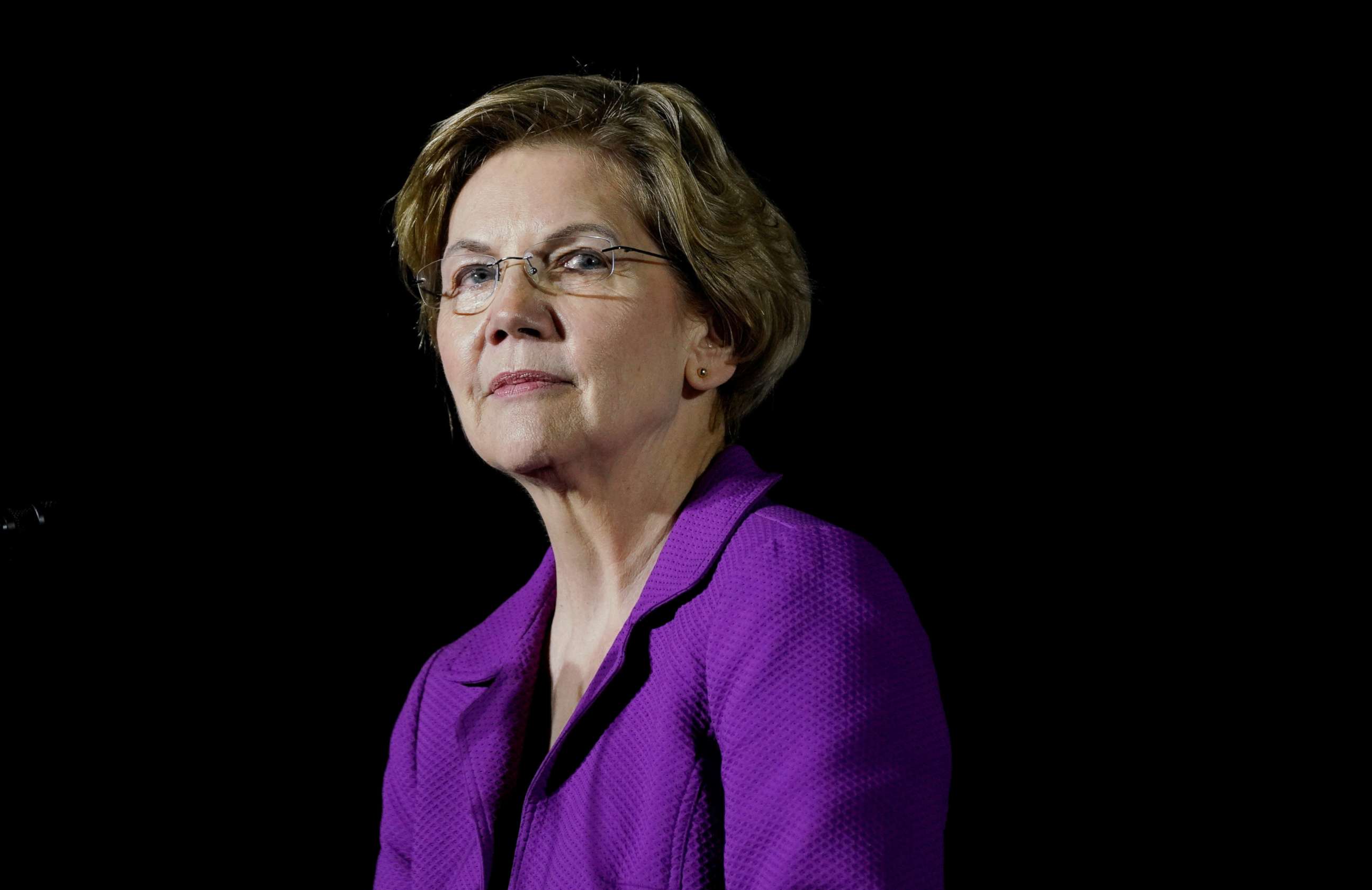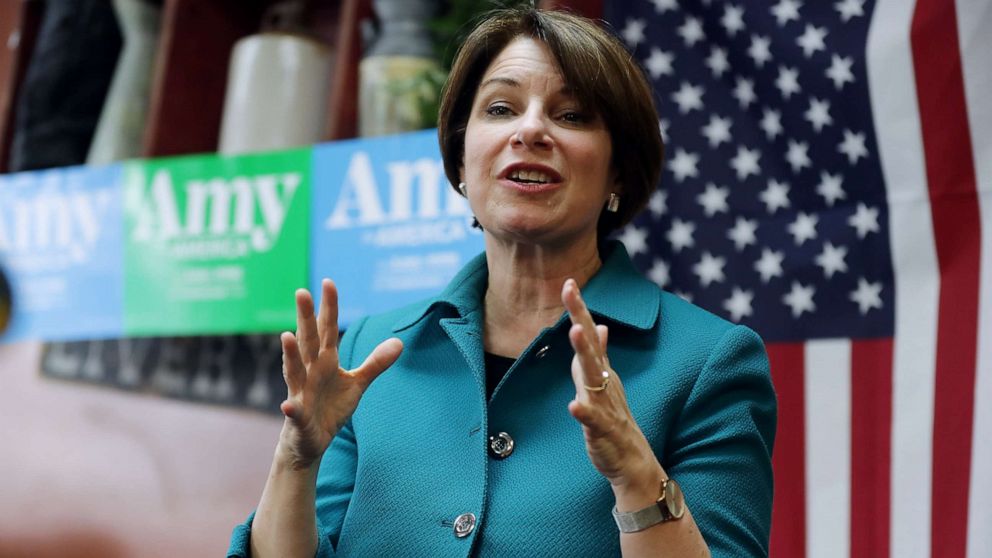Former presidential candidates seek to put spotlight on voting access amid pandemic
As election experts weigh into the groundswell for mail voting, support for making a general election just months away safer and more accessible during a pandemic is becoming a political platform for many of the nation’s most visible senators.
Chief among the lawmakers leading the charge for greater voting access are Democratic Senators Amy Klobuchar of Minnesota, Kamala Harris of California and Elizabeth Warren of Massachusetts -- three former presidential candidates who are now presumed to be top contenders for the role of Joe Biden’s vice president, and who appeal to a broad range of voter demographics.
With less than six months until November, election experts and some lawmakers are already anticipating the ongoing coronavirus pandemic will cause disruptions in the way many Americans vote. Those concerns are echoed by each of the senators, all of whom have put forth individual proposals that aim to bolster voting access efforts since the time the aftershocks of the coronavirus pandemic began manifesting across the country.
Their calls to action are not completely new -- each of the senators made cases for greater access at the ballot box as presidential hopefuls during their time on the campaign trail. At the time, the proposals were presented as components of their larger presidential platforms, but now, as the much delayed primary season finally inches to a close and traditional campaigning comes to a halt, the senators are back at work in hopes of making a lasting impact in November.
Sen. Amy Klobuchar
For Sen. Klobuchar the realities of the ongoing COVID-19 pandemic hit close to home early on, as her senate office announced in late March that her husband, John Bessler, had been hospitalized after testing positive for the virus. All the while, Klobuchar was focusing on voting rights, an issue central to her defunct presidential campaign, and alongside Oregon Sen. Ron Wyden introduced the National Disaster and Emergency Ballot Act of 2020. Their aim: to expand in-person early voting and ensure mail-in ballot access nationwide.
Klobuchar and Wyden’s bill started off with 25 original co-sponsors and has grown to a list of 36 total Senate Democrats, including several of Klobuchar’s former Democratic presidential primary opponents like Sen. Bernie Sanders of Vermont and New Jersey Sen. Cory Booker.
And likely important to the presidential election in November, some of the cosponsors of their bill also include several names that have been floated as being on Joe Biden’s vice presidential shortlist, such as Sen. Harris, Sen. Warren, Wisconsin Sen. Tammy Baldwin and Nevada Sen. Catherine Cortez Masto.
Klobuchar even partnered with another vice presidential shortlister, former Georgia gubernatorial candidate Stacey Abrams, founder of Fair Fight Action, an organization that encourages voter rights and voting access, to produce a socially-distanced joint video urging for expanded voting access and reform ahead of the November election.
Since then, Klobuchar has used nearly every tele-townhall, Zoom townhall and television interview to push her bill to move out of the introduction phase. The bill’s details of which include providing funding to states to expand early voting, such as providing them with money for postage and stamps, opening polls up to 20 days ahead of election day to bolster crowds on Tuesday November 3rd, and to train a new generation of poll workers so as to not expose senior citizens to COVID-19.
The $2 trillion Coronavirus Aid, Relief, and Economic Security (CARES) Act passed by Congress, and signed by President Trump in late March went on to include $400 million in funding for provisions found in Klobuchar and Wyden’s bill. Their bill has also found broad support from various civil rights and advocacy organizations, including calls from a group of bipartisan secretaries of states for increased funding to expand early voting and vote-by-mail.
Since Klobuchar and Wyden’s rollout, a number of other senators have released similar or complementary bills. Asked by ABC News what makes their bill different, and what they hope are the short and long term effects of so much focus on voting rights and safety during this pandemic, Klobuchar says COVID-19 has made the need for access to safe voting options even more urgent.
“Americans are facing unprecedented disruptions to their daily lives, and we need to make sure that in the midst of this pandemic they don’t have to risk their health to vote,” Klobuchar wrote in a statement to ABC News. “While I have long focused on expanding access to the ballot box, the coronavirus pandemic has made the need for changes even more urgent. It's clear that we must ensure that states have the resources to implement early in-person voting and no-excuse absentee voting by mail programs - reforms that are widely supported by a majority of Americans."
Biden, someone Klobuchar has campaigned heavily for, has taken notice of Klobuchar’s efforts on voting rights and safety since ending her own presidential bid just a day before Super Tuesday to endorse him. According to a pool report from a joint virtual fundraiser in early May, Biden praised Klobuchar as a “real leader” on voting issues, before he went on to slam President Donald Trump’s criticism of by-mail voting as “bizarre,” given that Trump himself had voted by mail.
The president’s criticism of vote-by-mail has become a sticking point for Klobuchar, oftentimes comparing and contrasting it to the images of Wisconsinites putting their lives at risk to vote in the state’s April 7th primary. The state was plagued with a shortage of poll workers, consolidating voters to a limited number of polling locations that faced crowding and long lines.
“I think we were all left with a searing image of those workers in line in Wisconsin—some of them in homemade masks and garbage bags—standing in the rain just to be able to vote,” Klobuchar said, retelling the story during a tele-townhall with labor union presidents last week. “Dozens of them got sick, including a poll worker. At the same time, the President of the United States was able to vote in the luxury of 1600 Pennsylvania Avenue with his mail-in vote ballot that he got from Palm Beach, Florida. Every American should have that same right.”

Sen. Kamala Harris
The fallout over Wisconsin’s primary election also served as a key launchpad for Harris’ rollout of the VoteSafe Act of 2020. The sweeping proposal aims to address the logistical hurdles that could arise as voters cast their ballots amid the pandemic, while also offering election officials across the country support to keep polling places accessible and safe.
During a recent call with reporters, Harris said prior to the pandemic, her biggest concern regarding voting was convincing people why they should vote and she added that the worry has grown under current conditions.
“Now, we're concerned that [people] may say back to us, well, there's a reason now, there's a reason why I shouldn't vote, which is -- I don't want to get sick,” Harris said.
The $5 billion dollar proposal aims to address issues states might encounter through a three pronged approach, which would include bolstering vote by mail efforts, expanding early voting access, and creating safe polling places for people who prefer to vote in person.
“We want to put in place measures to make sure people will be safe because this election presents some of the biggest issues that we will ever and have ever faced as a country,” the California Senator said.
According to the latest assessment from New York University’s Brennan Center for Justice, at least $4 billion is needed to ensure that states will have the resources necessary to hold safe and secure elections in the fall. So far, federal stimulus legislation has provided $400 million to states to allocate toward conducting elections this year. The $3.6 billion proposal for election assistance that is included in the economic relief bill brought forth by House Democrats last week would round out the multibillion dollar recommendation backed by the Brennan Center.
Sen. Harris told ABC News she spoke with House Speaker Nancy Pelosi about election funding ahead of the roll out of the House Democrats’ latest stimulus proposal.
“The reality of it is that there have to be resources at the state level, federal level and local level to the extent they're able to put into allowing people to vote safely,” Harris said, “We're going to keep fighting for federal dollars to actually incorporate what we need to do around creating incentives for states.”
Senator Harris’ efforts to put a spotlight on voting accessibility recently gained the backing of the highest-ranking African American lawmaker in Congress, House Majority Whip Jim Clyburn, and the Chairwoman of the House Administration Subcommittee on Elections, Rep. Marcia Fudge, D-Ohio.
Clyburn’s partnership with Harris on the legislation, as well as his close ties to presumptive Democratic presidential nominee Joe Biden, opened the door for speculation about the possibility that the California senator is among the top contenders for Biden’s vice presidential slot.
Clyburn's endorsement of former Vice President Biden ahead of the South Carolina primary was a major factor in Biden's sweep of the Palmetto State. The victory was a first for Biden across the early state contests and served as a launchpad for his subsequent primary wins across the country on Super Tuesday. The South Carolina primary also offered an opportunity for Biden to show his strength among black voters, who comprise a significant bloc of the Democratic electorate. In 2016, black voters made up 61% of Democratic primary voters in the state, according to ABC News exit poll results.
As one of the two African American senators who ran against Biden in the primary, Sen. Harris made appeals to black voters and urged other Democratic leaders to examine their interactions with the community.
"For too long, I think candidates have taken for granted constituencies that have been the backbone of the Democratic Party," said Sen. Harris said last year during the fifth Democratic debate in Atlanta, “They show up when it's, you know, close to election time and [they] show up in a black church and want to get the vote, but just haven't been there before.”
At the time, Harris warned against taking voters for granted and acknowledged the societal barriers people may face even before heading to the polls. With the introduction of the VoteSafe Act, she hopes the voting obstacles ahead of November will be alleviated.
“I think it's very important to understand, we are not telling people how to vote. We're not telling people who to vote for. We're simply saying, this is your right as a patriot -- this is an extension of you, when you go to vote -- an extension of fighting for the democracy of our republic,” Sen. Harris said to ABC News.

Sen. Elizabeth Warren
Nearly a year ago, Sen. Warren released what she called her “Plan to Strengthen Our Democracy,” in which she proposed a broad overhaul of the nation’s election systems. The ideas Warren brought forth at the time included instilling more oversight over federal elections, providing state-of-the-art resources to states for administering elections in a secure way, and expanding voting access.
“We have around 8,000 election jurisdictions all doing their own thing. They are overstretched, under-resourced, and their technology is often laughably out of date,” Warren wrote at the time in a Medium post.
This year, with many of those types of elections still on horizon, Warren published another election-related plan. The proposal happened as Americans were grappling with the sweeping impacts of the coronavirus pandemic, and as voters in Wisconsin headed to polls to vote in the state’s controversial primary, despite federal health safety recommendations.
“Since the campaign started, one of the core pillars of all her stump speeches was strengthening our democracy,” a Warren aide said to ABC News in an email. “A theme of her democracy plan and the plan she released last month amid the COVID-19 pandemic is the need for federal standards to ensure that every eligible American can vote and have their vote counted.”
Warren’s “Protecting Our Elections During the Coronavirus Pandemic” plan proposes extending the early voting period to be at least 30 days, calls for hazard pay for poll workers, and provides oversight on the maintenance of states’ voter rolls amid the ongoing state of emergency across the country. The plan also advocates for “proactively mailing all registered voters absentee ballots with self-sealing return envelopes and pre-paid postage” and discusses the importance of supporting the U.S. Post Office.
The Massachusetts Senator’s ability to churn out rapid-fire policy proposals as a presidential candidate offered a roadmap to the kinds of policies she is now eyeing in the Senate as one of its most visible lawmakers. That kind of branded preparedness could also be the reason why she is presumed to be among Joe Biden’s top picks for vice president.
Like her Senate colleagues who are also thought to be under consideration, Sen. Warren’s latest plan to support elections outlines a similar multibillion dollar proposal that aims to ensure states have the resources and logistics necessary to conduct elections this fall. Warren maps out that at least $4 billion dollars is necessary to help states administer elections, and her office points to the latest proposal brought forth by House Democrats as the vehicle for potentially fulfilling that total amount.
In an email, an aide to Warren indicated that the various plans coming from Senate Democrats demonstrate how seriously the party as a whole is taking voting accessibility. Warren is a co-sponsor of both Harris’s VoteSafe Act and Klobuchar’s National Disaster and Emergency Ballot Act, and as negotiations over the recently proposed economic relief bill continue, Senator Warren echoed that notion by offering tough words across the aisle.
“Republicans are using the coronavirus crisis to accelerate an undemocratic power grab and disenfranchise millions. The USPS is on the brink of collapse. And this government continues to work more for the wealthy and well-connected than the Americans struggling with this public health emergency and economic crisis,” the senator said to ABC News in a statement.
Warren’s concern over the potentially perilous state of the U.S. Postal Service comes as the Postmaster General says the agency could run out of money by the end of the fiscal year in September without help from Congress and the Trump Administration. Part of the financial losses described by the agency are due to an unprecedented drop in mail stemming from the spread of COVID-19. The aid package proposed by House Democrats last week includes $25 billion to help the financially-crippled agency, but as negotiations continue, time is running out, and the lack of a functioning Post Office would severely hinder any new vote by mail efforts ahead of November.
“Protecting our democracy is vital. Congress must act now to protect our upcoming elections, keep voters and poll workers safe, and safeguard our electoral institutions for the long haul,” Warren wrote.
What can happen next?
As negotiations over aid to state and local governments continue on Capitol Hill, election experts are sounding the alarm over the perils facing the November election if adequate funding is not allocated soon. According to experts at the Brennan Center for Justice at New York University's Law School who spoke at a virtual panel discussion earlier this month, state election officials have about a month to six weeks to significantly address 2020 election needs in order to be able to hold elections in the fall.
The most significant issues they say need to be addressed overlap with elements of each of the Senators’ proposals -- including providing the necessary infrastructure to register voters; bolstering mail and absentee voting; and ensuring elections are safe and accessible to people who need to vote in person. These experts also say an increased focus on combating misinformation that could arise due to any changes with the voting process should also be examined.
Larry Norden, Director of Election Reform at the Democracy Program within the Brennan Center for Justice, said vendors who supply states with election essentials like envelopes and ballots need jurisdictions around the country to place orders by mid-June in order to fully make the November election deadline. In order to place those orders, states need to know how much federal economic relief they will ultimately receive.
"We don't need to necessarily see the money out the door from Congress but if election officials are going to start making these orders they need to know that the money is coming," he said.
"Four billion may sound like a lot of money and of course it is, and in normal times, I would say, there would be no chance that Congress would possibly provide that much money, but of course this is not normal times," Norden added.




